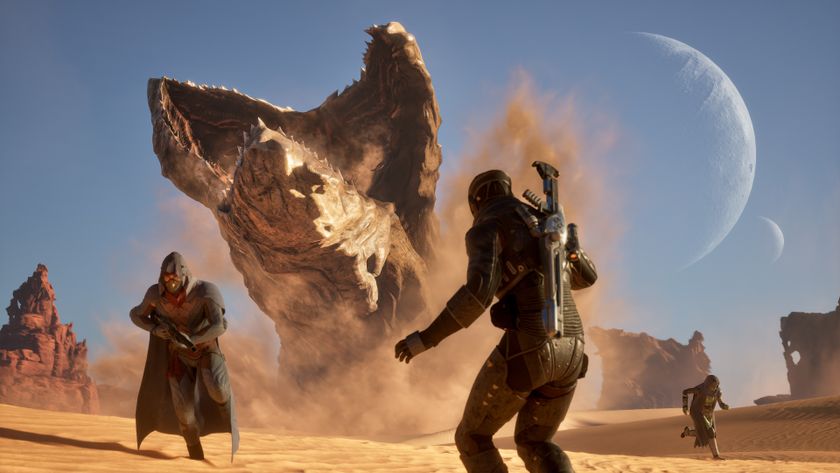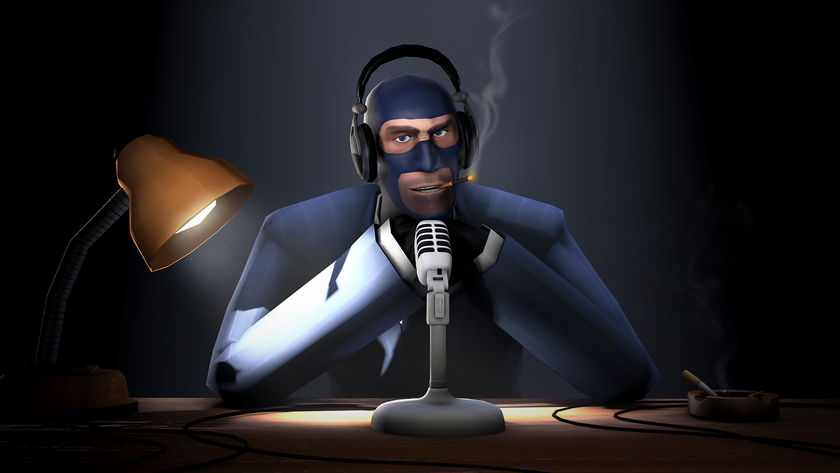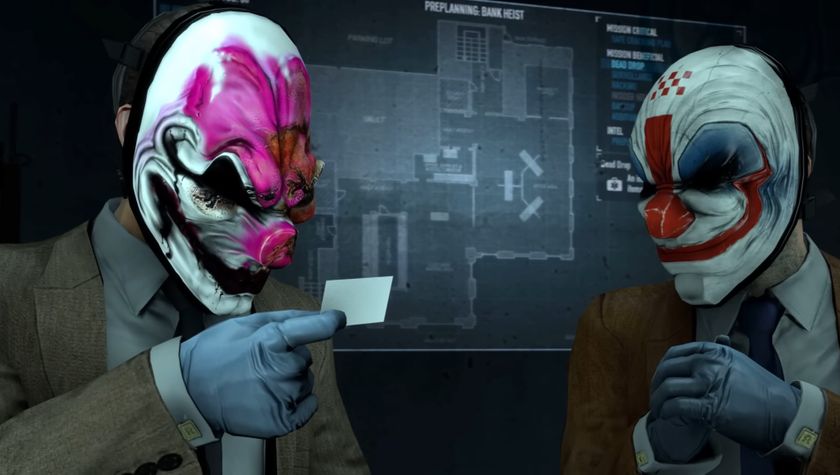Total War: Warhammer's battle designer on blood and badass magic
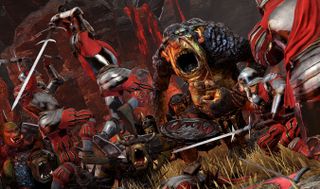
On the final day of E3, I had a chance to watch one of the show’s most exciting demos: a scripted run-through of a Total War: Warhammer battle. Orc shamans called down giant comets to crush whole units of troops. Giants stomped across the battlefield. Goblins rode on spindly war spiders. The battle was just a taste of the whole Warhammer package—I didn’t get to see any of the world map strategy layer or skill trees or politics—but Warhammer is first and foremost about battles, and these battles look like a blast.
After the demo, I chatted with Creative Assembly’s Simon Mann, Total War: Warhammer’s battle designer. It was the most enthusiastic conversation I’ve had about orcs since my days of memorizing every bit of lore in Blizzard’s Warcraft II manuals.
PCG: So, we just got to see the demo and the first question I asked, which maybe you can’t answer, is where’s all the blood?
Simon Mann, battle designer: I mean, it’s been quite traditional in previous Total War games that we don’t strictly release with all the blood and gore in there, and it’s largely age ratings. It’s something we always explore and we’re always looking into, but I think you’ll find it will be similar to the previous Total Wars, where it’s something that's an option and it's something that you’re able to bring into the game.
PCG: I was trying to remember, because I’ve played a lot of Shogun and a lot of Rome, and I thought that was in there by default, but maybe it’s a thing I’ve always check-boxed.
Mann: Actually, it was a pack that you would download, so you get the blood and gore DLC packs like in Rome 2 and Shogun 2.
PCG: Clearly, it’s just instinct for me.
The biggest gaming news, reviews and hardware deals
Keep up to date with the most important stories and the best deals, as picked by the PC Gamer team.
Mann: I think you just got it straight away and went, ‘Yeaaaaah!’
PCG: I just want to see the gladiators just chopping dudes’ heads off.
Mann: I find it more fun, I have to [turn it on].
PCG: So, what we saw looked great. I loved all the animation that he mentioned had to all be hand-done, because you can’t mo-cap a giant spider and stuff like that.
Mann: No, they’re really, really tempermental to mo-cap.
PCG: It seemed like there's a pretty big variety of units.
Mann: It’s huge! I mean, seriously, you look at previous Total War titles and it’s very much man versus man. Even though different factions would be quite unique themselves, you’ve still got a lot of commonality between them for the unit types that you would see in battle. Now, that commonality is gone. The Warhammer world embraces the differences between all the units. You look at the models and all things are different shapes and sizes and styles. We’ve really been trying to bring that to life in the game and literally the amount of animations that’s required, the amount of new animation skeletons—the skeletal rigs for the different creatures—all new in ways that we’ve never done before. As you said, an eight legged spider, that’s not something we’ve ever done before.
PCG: What are the factions that are going to be in the game?
Mann: So the four races that we have available in the tentpole release are going to be the Vampire Counts, the Dwarves, the Greenskins, and the Empire. This is the start of a trilogy for us, so this is the first game and there’s going to be two more expansions. The idea is that they’re all standalone, but you can kind of bring them all together, so if you own all three it’ll be increasing the size of the world, the races you get, and things like that. And we’re also going to be releasing DLCs and free DLCs to come along with it. We started small so we can concentrate, and as you saw the amount of detail and work we’ve gone into with each of these races basically means, with these four, we can give them that depth, that kind of attention, but then as we continue we’ll expand out and get larger.
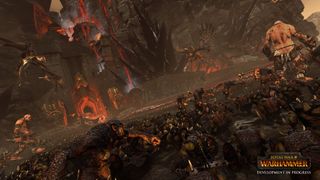
PCG: As soon as I saw it, it made me realize how much I miss Warcraft. There aren’t really that many fantasy settings that have that depth of lore and variety and stuff that are done in a strategy setting. You know, Warcraft has not been a strategy game for a long, long time and Warhammer is bigger in terms of breadth of the lore.
Mann: They’ve taken a lot of tropes and things like that and formed them into their lore, their narrative, and we’ve got all that on tap for us. We can take anything we want from their rulebooks. The thing is, they’ve done everything. You’ve got vampires drinking human blood, you’ve got these huge Greenskins, you’ve got the dwarves living in these underground caverns. There’s a lot of cool stuff going on and we can bring all that along.
PCG: And magic.
Mann: Yeah!
PCG: One of the things in the video was they showed off two or three different magic abilities. I think each one of them decimated an entire unit instantaneously. How do you balance magic with more traditional spear units that stand there and poke at each other for five minutes. It takes a while for a spear legionnaire unit to wipe out another spear legionnaire unit. It doesn’t take long for a magician to kill everybody, seemingly.
Mann: It can be quite powerful, right? So you saw some very high level spells that would be used more towards the late, mid endgame of a campaign map that you’d be seeing there. Basically the idea with the spells is that you do get some really powerful ones, like you saw the kind of ender called the ‘Comet of Casandora’. He literally calls a comet down from space to crush his enemies. It’s great. It’s always going to be tough to balance something like that because they are by their nature very powerful spells and we’ve really tried to take [from] the tabletop game, so these are all spells that you’d see in the tabletop game. They come from laws. So every spellcaster has different spell laws they can access spells from. The spells aren’t always damage-dealing spells, you can have buffs and debuffs. We brought over this idea called the Winds of Magic which is in the tabletop game as well. Essentially think of it like a mana pool that you get. Depending on where you’re fighting and other conditions, you’ll start with different amounts.
PCG: Does it mean there are some more maps that are magically charged?
Mann: Yeah! Basically. There are these kind of magic towers that act as pylons for the chaos magic, which is traveling from the north gate to the south gate. It’s just magic traveling across the world and that’s their Winds of Magic. You start with different levels and it will charge up over time. Now, these spells, they’re expensive, they’re probably going to cost the entire mana pool. To fill it up totally you're going to use all of it to cast one of these big damage-dealing spells, so you may not have that option at the start of the battle. You’ll need to sit there and wait for it to charge up or cast some smaller spells. It’s your choice. You’ve got to decide which you think will be more effective. You have to hit these spells at the right time. There are some really strategic ideas. If the enemy army is really spread out, a spell like that is actually a bit of a waste of magic.
PCG: Right, you might kill forty guys.
Mann: Yeah, you might take out maybe half a unit or something like that, and that’s good, but you’ve used all your magic to do that, and you could have pretty much buffed your whole army at that point and they could have dealt a whole lot more damage themselves. We’re very much trying to make sure although its very visual and very bombastic, we’re trying to make sure it fits in with the Total mechanics and doesn't just become ‘the game changer’—the only thing that’s massive. I think you can see we’ve got loads of other features that just add to the options rather than becoming the sole option for victory. The flying units, for example, are a really really big thing for us, and my favorite feature that we’ve brought in. It's like a second layer of combat, right?
You're no longer bound to the ground, as it were. Historical games have not have the option to do this, unfortunately, but they’re a wonderful unit. You’ve got these air-to-air battles, you saw in our pre-alpha demo Karl Franz on a Deathclaw fighting a wyvern with an Orc War Boss on top. They’re fighting for the superiority of the aerial battlefield, but then those units can come crashing down to the ground.
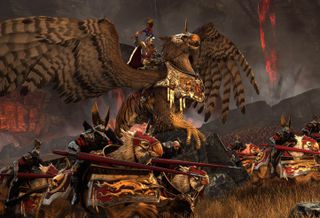
PCG: Are they more vulnerable on the ground, usually?
Mann: Exactly. You’ve got it. They’re almost like shock cavalry. Previously you’d flank with your shock cavalry to hit the enemy and manage to get to the soft, squishy center of their army. And that’s exactly what these flying units do. They’re a really good counter for spell casters, right? If you’ve got your vulnerable wizard at the back of your formation, they can just come in and hit it and deal damage, so you’re going to have to protect your spellcasters, because these units on the ground, if they get attacked by lots of units, you can take them down really, really quickly. And certainly against ranged fire as well, they’ll start taking a lot of damage.
Everything has a counter—it's all about the strengths and weaknesses, flying creatures are really good assassin units. You can get them in, maybe take someone out, but if you leave them there and don’t manage them properly, they’ll get taken down quickly.
PCG: As soon as I saw how powerful the spellcasters were, it made me think, is it going to affect strategy where people are like, ‘Okay, I have to run my cavalry and get them in there to kill that guy before he charges up his magic.”
Mann: I think we’ve always had a big thing about that, though. If you have all the ranged units, for example, your battle strategy changes a whole lot. And actually, in previous Total War games, one of the main strategies is to take out their ranged units so that suddenly you’re not threatened, you can just deal with them from range and do a lot of damage. I think there’s superiority in that.
PCG: In Shogun my favorite faction, I can’t remember their name, they had those amazing archers. I would just buy a shitload of archers and put them on a hill and nuke people before they could get to me. So, kind of along those lines, there’s a lot of typical strategy that Total War games have, like putting your army on a hill so you get your charge bonus and the enemy has to climb up the hill, or using terrain cover to hide some units, stuff like that—how much of that strategy are we going to see applied to these battles? Or are there new strategies that apply to the different races?
Mann: We’re going for a little bit of both. So like you saw in the demo, you saw the Empire cavalry hiding in a forest. You’ve still got these areas of the battlefield that are useful, but we’re moving more towards rifle warfare with a lot of units. You saw the Empire, lots of hand gunners, lots of rifle units. The Greenskin cavalry, when they’re charging over the hill, it blocks the line of fire. The terrain is very much used to your advantage, and because we’re doing a fantasy title we can magnify that and make it much more visual in the way that it works.
We’re definitely going to be bringing a lot of those in, but we’re also going to be exploring other options with things like ground types and stuff like that as we go along. We’re still locking down exactly what we’re doing with that, but we’re definitely going to be trying to keep that kind of environmental gameplay alive. So I think that’s a really important string to our bow when it comes to how a battle plays out, because otherwise all battles are going to play out very similarly, but [depending on] the actual environment that you’re playing in—this comes into the Winds of Magic as well—and the style you’re fighting, you’re going to have a very different battle experience.
PCG: That’s really interesting. Are the hero units basically the same as generals in the older games or do they have more depth to them, more story tie-in?
Mann: Yeah. For me, certainly, I think character is one of the biggest things we’re trying to bring with this, and Total War games always have story, which is your story. You’re creating your emergent story in the world. I always loved that you find a character that you love, and you level them up and they become someone that you feel a bit attached to.
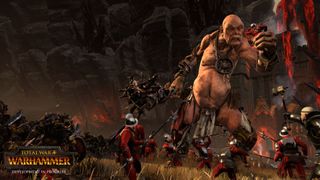
PCG: It’s very much what you put into it.
Mann: Yeah, and and the characters kind of grow. We’re really trying to keep that core, so the lords and leaders of your army, they start growing, they gain traits. We’ve got a really, really advanced skill system, so you can choose how they grow mechanically. Are they really strong on the campaign, city management? Are they amazing in battle? You get to choose the paths for these characters. We’ve taken away the idea of time, although you have turns and time passes, the passage of years is no longer a factor. No one will get old and die. So, you keep your characters, they’re yours. You don’t have to worry about them expiring.
PCG: Except in battle.
Mann: Except in battle. But the main lords like Karl Franz, really core characters from Warhammer, we’re going to make sure they’re immortal. They stay in your faction. If they fall in battle, they’re wounded and you lose them for a number of turns. One of the main reasons for that is we really want to help tell the story of the Warhammer world and build that.
But then you’ve got the heroes, as well. Heroes are what we would’ve called Agents in previous games. Now, for the first time, they’re doing all the things you’d expect, but they’re a character in their own right. They’ve got their own skill trees and their own advancements. Are they good at campaign? Are they good at battle? Things like that. But for the first time in a Total War game, and I think this is really cool, you can attach them to your army and they're in the battle as single entity units that fight for you. They’ve got all of their skills and abilities, but if they fall and die you’ve lost all of it. It’s a real risk/reward system.
PCG: One of the things people love about Warhammer in a meta sense is customizing their figures and doing this tiny detail paintwork. Are you going to have something like that, where you can change the styles of your army, or other elements?
Mann: I think we’re really, really aware that customization’s important. In the office we all play the tabletop game. We got two of every boxed model when we signed up with Games Workshop. Everyone has an army on their desk. It’s absolutely insane! So we’re really aware that that’s a big part of the gameplay. While we’re not planning that for the tentpole release—we’re really trying to concentrate on the central lore and the old world that we’re trying to deliver with this—hopefully in the future it’s something we’ll start looking into a bit more as we release more expansions and DLC.

Wes has been covering games and hardware for more than 10 years, first at tech sites like The Wirecutter and Tested before joining the PC Gamer team in 2014. Wes plays a little bit of everything, but he'll always jump at the chance to cover emulation and Japanese games.
When he's not obsessively optimizing and re-optimizing a tangle of conveyor belts in Satisfactory (it's really becoming a problem), he's probably playing a 20-year-old Final Fantasy or some opaque ASCII roguelike. With a focus on writing and editing features, he seeks out personal stories and in-depth histories from the corners of PC gaming and its niche communities. 50% pizza by volume (deep dish, to be specific).
Most Popular





